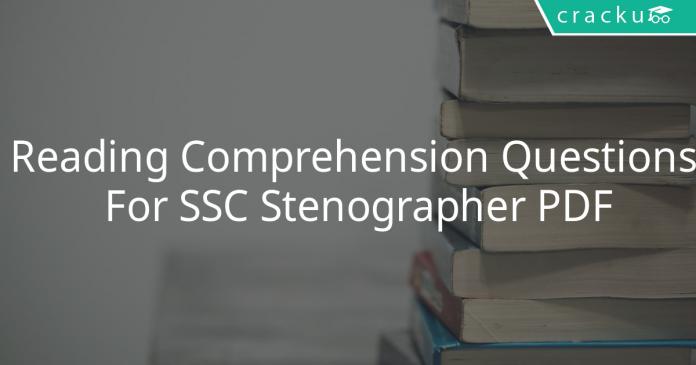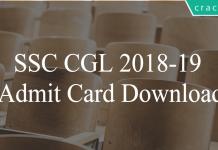Reading Comprehension Questions For SSC Stenographer PDF
SSC Stenographer Constable Reading Comprehension Question and Answers download PDF based on previous year question paper of SSC Stenographer exam. 20 Very important Reading Comprehension questions for Stenographer Constable.
READING COMPREHENSION QUESTIONS FOR SSC STENOGRAPHER PDF
10 Stenographer Mock Tests – Just Rs. 117
Download All Important SSC Stenographer Questions PDF (Topic-Wise)
SSC Stenographer Free Mock Test (Latest Pattern)
SSC Stenographer Previous Papers
Instructions
A passage is given with five questions following it. Read the passage carefully and select the best answer to each question out of the given four alternatives.
Culture is defined as a people’s way of life. It entails how they dress, how they speak, the type of food they eat, the manner in which they worship, and their art among many other things.
Indian culture, therefore, is the Indian’s way of life. Because of the population diversity, there is immense variety in Indian culture. The Indian culture is a blend of various cultures in the world. India had an urban civilization even during the Bronze age. The Indus Valley Civilization (Harappan Civilization) dates back to 3300 BC – 1300 BC. Distinct cultures different from each other co-exist together in a single country. Thus, in India, there is unity amidst vast cultural diversity. The way people live in India is reflected in its culture.
Unity in Diversity: India is a land of unity in diversity where people of different sects, caste and religion live together. India is also called the land of unity in diversity as different groups of people co-operate with each other to live in a single society. Unity in diversity has alo become the strength of India.
Secularism: The word secularism means equality, impartiality, etc, towards all religion. India is a secular country, which means, equal treatment of all the religions present in India.
Traditions: traditional cultural values
1) Touching feet of elders: Indian tradition has rich cultural values. In India, younger show great respect to their elders. They touch the feet of their elders daily after waking up and especially on the festive occasionally on the festive occasions or before starting an important work.
2) Namaste: The gesture of the Namaste greeting is also part of the Indian culture. People greet each other by saying “Namaste” while joining their hands. “Namaste means “Hello”. (Also read. The meaning of Namaste here.)
3) Most Indians have a habit of shaking their heads while talking.
Question 1: What is the reason behind the immense variety in Indian culture ?
a) Blend of various cultures
b) Population diversity
c) Cultural diversity
d) Secularism
Question 2: Based on the above passage, which of the following is NOT true about Indian culture ?
a) Indian culture dates back to 3300 BC – 1300 BC
b) Every religion follows their own tradition and customs.
c) Every religion is treated equally in India.
d) In India there is unity in diversity.
Question 3: Which of the following is not true according to the passage ?
a) Culture entails how people dress.
b) Culture entails how people speak.
c) Culture entails how people worship.
d) Culture entails what drawing people draw.
Question 4: Why is India called a unity in diversity ?
a) Different groups of people co-operate with each other.
b) People of different sects, caste and religion live together.
c) It is strength of India.
d) All of these
Question 5: If I am a cultural, well-behaved Indian, what won’t do ?
a) Touch the feets of the elders.
b) Join my hands while doing ‘Namaste’.
c) Wake up early in the morning, especially on the festive occasions.
d) Shake my head as a habit while talking.
Download SSC Stenographer Syllabus PDF
Instructions
In the following passage some of the words have been left out. Read the passage carefully and select the correct answer for the given blank out of the four alternatives.
Life priorities and (191) are never going to reduce. But among all of them, make some time for (192) the well being of the environment you live in. To save our environment, (193) life changing movement, is required. If anything is required, that is will power, honest (194) and some small initiatives. Save our environment by being a responsible citizens. Teach your child and others to save water. Do not waste water It’s a very (195) element of our environment.
Question 6:
a) contradictory
b) precious
c) healthy
d) bulky
Question 7:
a) assurance
b) factor
c) working
d) inclination
FREE SSC MATERIAL – 18000 FREE QUESTIONS
Question 8:
a) Some
b) huge
c) no
d) sufficient
Question 9:
a) ensuring
b) resulting
c) developing
d) enarging
Question 10:
a) dreams
b) ambitions
c) passions
d) necessities
Instructions
In the following questions, read the passage carefully and choose the best answer to each question out of the four alternatives.
Passage 1
Ultimately, we all have to decide for ourselves what constitutes failure, but the world is quite eager to give you as set of criteria if you let it. So I think it fair to say that by any conventional measure, a mere seven years after my graduation day, I had failed on an epic scale. An exceptionally short-lived marriage had imploded, and I was jobless, a lone parent, and as poor as it is possible to be in modern Britain, without being homeless. The fears that my parents had and for me, and that I had had for myself, had both come to pass, and by every usual standard, I was the biggest failure I knew.
Now, I am not going to stand here and tell you that failure is fun. That period of my life was a dark one, and I had no idea that there was going to be what the press has since represented as a kind of fairy tale resolution. I had no idea then how far the tunnel extended, and for a long time, any light at the end of it was a hope rather than a reality.
So why do I talk about the benefits of failure ? Simply because failure meant a stripping away off the inessential. I stopped pretending to myself that I was anything other than what I was, and begin to direct all my energy into finishing the only work that mattered to me. Had I really succeeded at anything else. I might never has found the determination to succeed in the one arena I believed I truly belonged. I was set free, because my greatest fear had been realised, and I was still alive, and I still had a daughter typewriter and a big idea. And so rock bottom became the solid foundation on which I rebuilt my life.
You might never fail on the scale I did, but some failure in life is inevitable. It is impossible to live without failing at something, unless you live so cautiously that you might as well not have lived at all in which case, you fail by default.
Failure gave me an inner security that I had never attained by passing examinations. Failure taught me things about myself that I could have learned no other way. I discovered that I had a strong will, and more discipline than I had suspected; I also found out that I had friends whose value was truly above the price of rubies.
The knowledge that you have emerged wiser and stronger from setbacks means that you are, ever after, secure in your ability to survive. You will never truly know yourself, or the strength of your relationships, until both have been tested by adversity. Such knowledge is a true gift, for all that it is painfully won, and it has been worth more than any qualification I ever earned.
Question 11: As per the passage, which of the following statements best compares India’s pre-independence (pas) period to the post-independence (future) period ?
a) India’s past was a period of poverty and ignorance while its future will be a period of adventure.
b) India’s past was a period of slumber while its future will be a period of triumphs.
c) India’s past was a period of struggle while its future will be a period of hope, triumphs and achievements.
d) India’s past was a period of criticism while its future will be a period of peace.
Question 12: Which of the following statements best describes the message of the passage ?
a) India’s futures is filled with incessant striving and providing services to millions of sufferers.
b) India needs to wake up to the call of future and end her sorrows of the past.
c) The independence of India is being celebrated as it has opened the door to the triumphs and achievements that have long awaited us.
d) The birth of freedom has brought in its wake more responsibility of fulfilling our pledges and creating a new history.
Question 13: Which of the following is the most suitable title for this passage ?
a) A star of hope rises
b) A fateful moment for India
c) The success and failures of India
d) Challenges facing the Indian economy
Question 14: How can we fulfil our pledges that we have taken in the past and the present ?
a) The people of India need to set a hope that can never be betrayed.
b) The people of India need to provide a service to millions of people who suffer in their country.
c) The people of India need to do labour and hard work to given reality to their dreams.
d) The people of India need to work with more responsibility now which has been brought by power and freedom.
Question 15: What is the greatest challenging that India faces today as per the passage ?
a) It is a challenge to end poverty, ignorance, disease and inequality of opportunity.
b) It is a challenge to wipe off tears from every year and thus eradicating suffering.
c) It is a challenge to build a noble mansion of free india.
d) It is a challenge to fulfil the pledges that we have so often taken.
SSC STENOGRAPHER PREVIOUS PAPERS
Question 16: According to the author, with is the impact of failure on person ?
a) A person emerges wiser and stronger implying that he is secure in his ability to survive.
b) A person realises that happiness in life does not depend on the achievements or acquisitions
c) A person realises that his qualifications and CV are not his life.
d) A person realises the strength of his relationships by identifying his true friends.
Question 17: Which of the following is a suitable title for this passage ?
a) What constitutes failure ?
b) Failure is inevitable in life
c) Failure has its benefits
d) A hope rather than a reality
Question 18: Way does the author say that failure is ‘inevitable in life?
a) Because nothing can prevent the caprice of fate.
b) because not all of us are well-acquainted with failure.
c) Because life is difficult and too complicated.
d) Because the fear of failure takes precedence over the desire for success.
Question 19: Which of the following is a major benefit of failure according to the passage ?
a) Failure helps in stripping away the inessential
b) Failure teaches you things which you could not have learnt in any other way.
c) Failure gives you an inner security which cannot be otherwise attained.
d) Failure helps you in finding the determination to succeed.
Question 20: According to the author, what can be defined as ‘failure’?
a) Failing on a epic scale
b) Not truly knowing yourself
c) Living your life so cautiously that you do not fail
d) A situation where all your fears come to pass
Answers & Solutions:
1) Answer (B)
2) Answer (B)
3) Answer (D)
4) Answer (D)
5) Answer (C)
6) Answer (B)
7) Answer (A)
8) Answer (C)
9) Answer (A)
10) Answer (D)
FREE MOCK TEST FOR SSC STENOGRAPHER
11) Answer (C)
12) Answer (D)
13) Answer (B)
14) Answer (C)
15) Answer (A)
16) Answer (A)
Passage-2
Long years ago we made a tryst with destiny, and now the time comes when we shall redeem our pledge, not wholly or in full measure, but very substantially. At the stroke of the midnight hour, when the world sleeps. India will awake to life and freedom. A moment comes, which comes but rarely in history, when we step out from the old to the new, when an age ends, and when the soul of a nation, long suppressed, finds utterance. It is fitting that at this solemn moment we take the pledge of dedication to the service of India and her people and to the still larger cause of humanity.
AT the dawn of history India started on her unending quest, and trackless centuries are filled with her striving and the grandeur of her successes and her failures. Through good and ill fortune alike she has never lost sight of that quest or forgotten the ideals which gave her strength. We end today a period of ill fortune and India discovers herself again. The achievement we celebrate today is but a step, an opening of opportunity, to the greater trumps and achievements that await us. Are we brave enough and wise enough to grasp this opportunity and accept the challenge of the future ?
Freedom and power bring responsibility. That responsibility rests upon this Assembly, a sovereign body representing the sovereign people of India. Before the birth of freedom we have endured all the pains of labour and our hearts are heavy with the memory of this sorrow. Some of hose pains continue even now Nevertheless the past is over and it is the future that beckons to us now.
That future is not one of ease or resting but of incessant striving so that we might fulfil the pledges we have so often taken and the one we shall take today. The service of India means the service of the millions who suffer. It means the ending of poverty and ignorance and disease and inequality of opportunity. The ambition of the greatest man of our generation has been to, wipe every tear from every eye. That may be beyond us but as long as there are tears and suffering, so long our work will not be over.
And so we have to labour and work hard to given reality to, our dreams. Those dreams are for India, but they are also for the world, for all the nations and peoples are too closely knit together today for any one of them to imagine that it can live apart. Peace has been said to be indivisible, so is freedom, so is prosperity now, and so also is disaster in this one world that can no longer be split into isolated fragments.
To the people of India, whose representatives we are, we make appeal to join us with faith and confidence in this great adventure. This is no time for petty and destructive criticism, no time for Ill will or blaming others. We have to build the noble mansion of free India where all her children may dwell.
17) Answer (C)
18) Answer (A)
19) Answer (D)
20) Answer (A)
SSC STENOGRAPHER STUDY MATERIAL TOPIC-WISE
We hope this Reading Comprehension questions for SSC Stenographer will be highly useful for your preparation.





